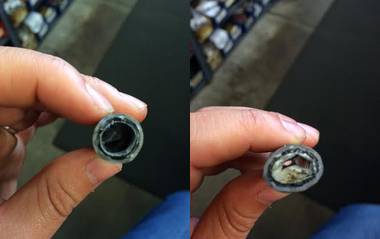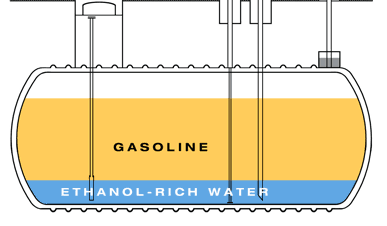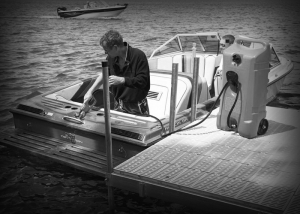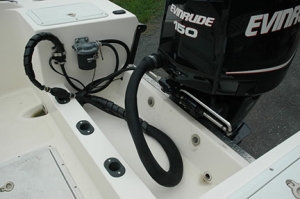Displaying items by tag: fuel
The Fight Against Fuel
If you ask any one of our mechanics here at Vans Sport Center what motor issues they see the most, they will tell you that the majority of service work they have to do on outboards now a days is fuel related. Which right there should tell you that making sure you have good fuel is one of the most important and preventive things you can do. The biggest problem with gas right now is the ethanol that is in it. The other major issue is letting it sit around and go bad. Gas can go bad over time due to water getting in the tank, oxygen, light, and the summer heat. This article will talk about some of the preventive measures you can take to avoid problems related to bad gas.
Protecting Your Fuel System From Water
INSTALLING A FUEL WATER SEPARATOR
One of the worst things for your outboard is bad fuel. Or even clean fuel for that matter with all of the ethanol that is in it. Which is a common problem our service department see's here at Vans Sport Center but that is another story. To safeguard from bad fuel, run your fuel through an inline water separator filter. It will prevent any problems with your motor due to bad fuel. Newer boats usually come with one already installed, but your older boats are probably not going to have. If your boat doesn't have one, it is an easy enough job you can do some Saturday or Sunday afternoon.
Fall Boating Perks
Fall is approaching and it will bring the somber end-of-summer vibes with it. Pack away your swimsuit, enjoy your tan while you have it, and kiss the warm weather goodbye - but whatever you do, don't send your boat in for storage just yet. Summer boating is nearly impossible to compete with, but that doesn't mean fall boating should be overlooked completely; it's still good for something.
It's good for your game
With a change in location and bait, fall can be a great time for bass fishing. The colder weather and water temperatures will coax the bass into shallower waters. It's best to use bait that does well in shallower waters: crankbait, spinner bait, or jerkbait to list a few. Because bass are more aggressive in the fall, preparing for cold months with little feeding ahead, they're willing to work for their food - so it will be especially beneficial to use lures that look like the shad that they're feeding on. Regardless of what type of bait you are using, try and mimic the shad with the color.
Fighting Against Ethanol Damage
It's only the beginning of summer and the service department here at Van's Sport Center is already full of boats and motors needing repairs; all fingers are pointed at ethanol. It's pretty clear that ethanol is the boating industry's kryptonite, with it's ability to cause costly damages to a boat engine and steer people away from boating. With some fuels even having a 15% ethanol blend, the risk of using ethanol fuel grows. However, it doesn't mean its time to throw in the towel. Ethanol may be here to stay, but there are still ways to avoid it's negative effects and protect your motor. Here are a couple things that will help you stay on the water and out of the shop:
Recreational fuel is your friend
Most of the time fuel offered at a gas station is ethanol based fuel with at least 10% ethanol blend, which can be harmful. Some places may even be using 15% blend. Ethanol is alcohol and it pulls moisture from the air, which means ethanol-based fuel can cause a variety of damages. For example, ethanol can cause your fuel line hose to fall apart and almost become mushy, causing your fuel line to plug. This is just one area of your motor that ethanol can damage. The breakdown of parts such as the fuel hose, creates residue which can cause goop or build up in other parts of the engine, leading to other problems. One way to prevent these damages and avoid needing repairs--use recreational, non-ethanol fuel. Many places offer a non-ethanol fuel, which can cost a little more but because it is better for an engine it could save you from an expensive trip to the shop in the future.

The left side shows a fuel line hose with no ethanol damage, while the right side shows a hose that is almost clogged from ethanol breaking it apart.
Treatments: additives and stabilizers
Although non ethanol fuel is ideal, there are treatments that can make using ethanol fuel not as risky. There are a wide variety of treatments you can use to prevent ethanol damage to your motor and they all help maintain a healthy engine. Ethanol can damage your motor when it separates from fuel because of the water that it absorbs, but these treatments help stabilize your fuel to help prevent damage. They are meant to provide protection during off-season storage but also during operational use; periods of storage often require a higher concentration of the treatment.
BRP has a treatment called 2+4 which is proven to be very effective and recommended to be used at every fill up for maximum year-round protection. Mercury has a 3 step treatment which includes their Quickare, Quickleen, and Quickstor. While Quickare and Quickleen are used to protect during the season, Quickstor is made to be used before storage and provide protection throughout the off-season. Amongst these, there are many other treatments available: such as, Seafoam engine treatment, Yamalube, Starbright fuel additive, and Sta-Bil fuel treatment and stabilizer.

There are a lot of different treatments and they're all aimed to protect your engine.
Fuel tank levels matter
Whether or not a full fuel tank is more vulnerable or safe is a question that is still in debate. While some say that a full tank allows less room for moisture to collect, others say that a full tank has more ethanol which will pull in more moisture than an empty tank with small amounts of ethanol.  Because it is hard to determine which one is better, a good solution is to determine a safe level for your fuel tank depending on the amount of expected future use. If you have a boat that is used often, maintaining a full tank would be advantageous. Cars are not at as big of a risk for ethanol damage because of their frequent use, so when a boat is used frequently a full tank does not increase the risk of damage. However, when you have a boat that is not used quite as frequently or being stored, running through the fuel completely will help eliminate risk of damage.
Because it is hard to determine which one is better, a good solution is to determine a safe level for your fuel tank depending on the amount of expected future use. If you have a boat that is used often, maintaining a full tank would be advantageous. Cars are not at as big of a risk for ethanol damage because of their frequent use, so when a boat is used frequently a full tank does not increase the risk of damage. However, when you have a boat that is not used quite as frequently or being stored, running through the fuel completely will help eliminate risk of damage.
While ethanol certainly poses a threat to outboards, there are things to do to that can help you avoid this or lower the intensity of the damages. Using the right fuel, treating your fuel and paying attention to the level of your gas tank are small tasks that can offer a big pay off. Don't hesitate to contact Van's Sports Center with any questions or boating needs!




